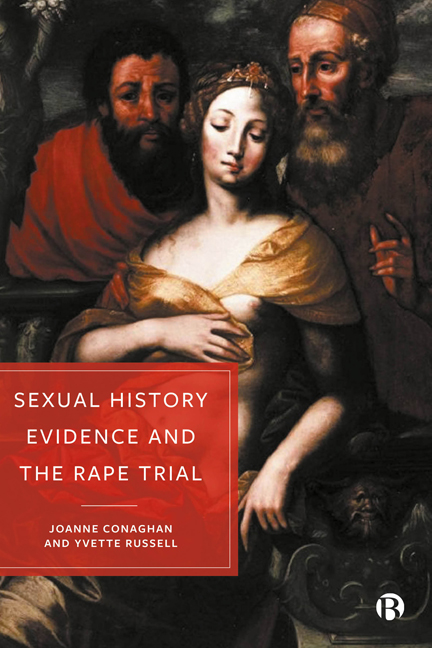Book contents
- Frontmatter
- Contents
- List of Cases
- List of Statutes
- About the Authors
- Acknowledgements
- 1 Introduction: Setting the Scene
- 2 A History of Rape Law in Action
- 3 Emergence of a Legal Regime Governing the Use of Sexual History Evidence
- 4 Legal Regulation: Limits and Potentialities
- 5 Tracking the Use of Sexual History Evidence in the Courtroom
- 6 The Relevance of Sexual History Evidence
- 7 Sexual History Evidence and Subjectivity
- 8 Conclusion: What Is to Be Done about Sexual History Evidence?
- References
- Index
1 - Introduction: Setting the Scene
Published online by Cambridge University Press: 03 April 2024
- Frontmatter
- Contents
- List of Cases
- List of Statutes
- About the Authors
- Acknowledgements
- 1 Introduction: Setting the Scene
- 2 A History of Rape Law in Action
- 3 Emergence of a Legal Regime Governing the Use of Sexual History Evidence
- 4 Legal Regulation: Limits and Potentialities
- 5 Tracking the Use of Sexual History Evidence in the Courtroom
- 6 The Relevance of Sexual History Evidence
- 7 Sexual History Evidence and Subjectivity
- 8 Conclusion: What Is to Be Done about Sexual History Evidence?
- References
- Index
Summary
Setting the scene: from Ched Evans to #MeToo
On 14 October 2016, four years after his initial conviction in 2012, Chedwyn Evans (known as ‘Ched’) was acquitted of rape in a retrial at Cardiff Crown Court after the admission of new evidence of the complainant’s sexual behaviour with other men. The verdict, and how it was reached, provoked intense, deeply diverging public responses. Evans’ celebrity status as a professional footballer with Sheffield United FC, alongside the public support provided by his fiancée (and her millionaire father), drew the inevitable attention of the tabloid press, fuelling an apparently insatiable public appetite for stories of ‘sleazy’ behaviour by sports stars and other celebrities (Brown, 2016). Meanwhile, Evans’ complainant had to be relocated repeatedly and to change her name after being relentlessly harassed and identified ‘thousands of times’ on social media (Morris, 2016a). The Evans saga – from first accusation, to conviction, incarceration, appeal and final acquittal – prompted an explosion of public commentary, speculation and (sometimes shallow) handwringing, at the heart of which lay, on any interpretation of the facts, a sordid tale of male sexual entitlement and female sexual degradation. As one headline after Evans’ acquittal declared: ‘There are no winners as rape case drags football down to its darkest depths’ (Herbert, 2016).
Nearly a decade later, the Evans case remains an unresolved point of contestation within criminal justice scholarship and debate. Other celebrity cases have come and gone, displacing it in terms of notoriety and public attention. The 2018 ‘Rugby Rape Trial’ (as it is popularly known) – in which Irish rugby players, Paddy Jackson and Stuart Olding, were tried and acquitted of rape in a Belfast Crown Court – plumbed the murky depths of the misogynistic culture which repeatedly surfaces in elite male sport, shocking and riveting the highly conservative Northern Irish public in equal measure (Killean et al, 2021: 3–5). #MeToo is also a post-Evans phenomenon, shifting the public gaze from sports personalities to film and entertainment moguls. In 2020, producer, Harvey Weinstein, was convicted of rape and sexual assault after multiple women who had worked with him blew the whistle on his predatory sexual behaviour. His conviction was soon followed by that of Ghislaine Maxwell, daughter of Robert Maxwell, the deceased media mogul: in 2021, Maxwell was convicted of trafficking girls for sexual purposes on behalf of financier and convicted sex offender Jeffrey Epstein (also deceased).
- Type
- Chapter
- Information
- Sexual History Evidence and the Rape Trial , pp. 1 - 17Publisher: Bristol University PressPrint publication year: 2023

